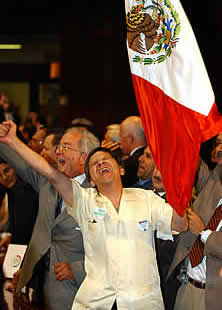 |
 |
 |
 Editorials | July 2005 Editorials | July 2005  
Mexican Emigres Cheer, Shrug at New Voting Right
 Sam Quinones - LATimes Sam Quinones - LATimes


| | A Mexican migrant reacts with joy after legislators approved a bill to allow Mexicans living abroad to vote in the 2006 presidential elections. (Photo: AP) |
The job of Los Inseparables del Norte is to remind Mexicans of the place they had to leave with songs of betrayal and unrequited love.

Daily, accordionist Santos Macias and Juan Jose Salazar on bajo sexto guitar traipse through the Alameda Swap Meet, southeast of downtown Los Angeles, to serenade people like themselves who left Mexico as economic outcasts.

Macias, for one, was therefore happy that Mexico had finally remembered its immigrants.

This week the Mexican Congress approved legislation that for the first time will allow citizens living outside the country to vote by mail in Mexican presidential elections, that began July 1, 2006.

Mexican officials estimate that 10 million of their compatriots live in the United States. Of those, an estimated 4 million may be eligible to vote in the next election. With this newfound power, immigrants can help make Mexico a country that people don't have to leave, Macias said.

"It's our country of origin," he said, his accordion lashed across his chest. "Most of us are thinking of going home. Naturally, we want to go home to a country that's better off."

Yet Macias was subdued. He'd felt his country's betrayal and unrequited love before. He'd voted several times in Mexico, and it had not done much good, he said. He had been forced to leave for lack of work.

Meanwhile, Salazar, his partner, had barely heard of the Congress' decision.

Like Los Inseparables del Norte, the Mexican community reacted with mixed emotions to their new voting right this week.

Immigrant leaders, who lobbied relentlessly for it, were overjoyed; people on the street took the development in stride.

Nonetheless, the decision seemed vindication for immigrants, who had long been disparaged by Mexican government officials as traitors to Mexico. In the last decade, immigrants and their dollars have become central forces in the development of many Mexican towns, often performing government responsibilities, such as building roads and classrooms.

These contributions have given them respect back home that many immigrants have used to influence how their relatives vote.

Immigrant leverage forced the Mexican Congress' hand this week, said Efrain Jimenez, project director for the Federation of Zacatecan Clubs in Southern California.

"Although the government has viewed me as a traitor to the country, my family doesn't view me that way," he said.

As immigrants organized into hundreds of clubs to support their hometowns, many of them awoke to their new power and yearned for political clout to go along with the money they had donated.

Among these was Oxnard businessman Juan Duran, who said he couldn't wait to vote.

Under a change in Mexican law, the 54-year-old auto shop owner ran four years ago for mayor of his hometown of Tepetongo in the state of Zacatecas.

He lost but remained involved in his hometown club, raising money for projects back home.

"Our lives are here, but they also are in Mexico," said Duran, a former farmworker and mariachi musician who ran for office as a member of the center-left Labor Party.

"This will provide an opportunity for democracy to spread throughout our country," he said. "That is the only way the Mexican people will get ahead."

Many immigrants, however, greeted their new rights with considerably less fervor.

"I didn't even know it had happened," said Adolfo Bravo, a jeans vendor at the Alameda Swap Meet from the state of Michoacan.

Along 4th Street, the commercial heart of Santa Ana's Latino community, the issue hardly raised a reaction among business owners.

"Some of my customers have talked about it," said Angeles Jimenez, owner of a clothing shop, J J's Outlet. "But they feel like some of us Latinos here feel. And that is: Much of the political power in the United States rests, as it does in Mexico, with the powerful, and they question the significance of one vote."

Mexican immigrants trying to survive in California's tough economy often have low-paying jobs, Jimenez said.

"They're worried about earning more money," she said. "They need to buy shoes, clothes for their children and put meat and tortillas on the table rather than worrying about voting in Mexico."

Others believe that voting in Mexico will be a harmful distraction for immigrants, deepening their ties to their homeland while keeping them from participating in the United States, where they spend most of their lives.

"Personally, I don't see the value," said Sam Romero, who runs St. Teresa's religious shop on 4th Street. "What we need to be doing is politically educating immigrants to do something positive here [in California]. Not there."

"Many of them still have strong ties with families and land in Mexico," Romero added, "and they're always saying, 'Someday I'm going back.' But few do, or, if they go back, they return to the United States."

Still, many were jubilant.

Hector Sanchez, a vendor of compact discs at the Alameda Swap Meet, viewed the new voting rights as a sign that Mexican politicians were finally listening to immigrants in the United States.

A 35-year resident of this country from the town of Cuautla, Morelos, Sanchez said he planned to travel to Tijuana to renew his Mexican voting credential to be able to vote next year.

"The remittances we send back — $16 billion or so — if that doesn't count, then nothing does," said Sanchez, 59.

For Los Inseparables del Norte, all this was secondary Friday to finding a few people to serenade with songs that remind them of the country they left.

"When my situation gets a little better, I'd like to return," Macias said. "No one likes to leave his country." | 
 | |
 |



